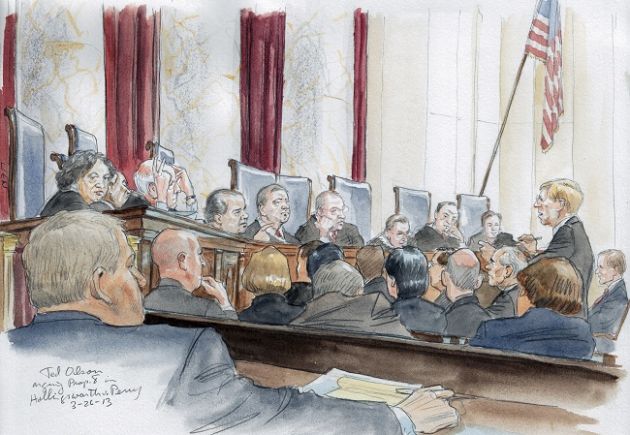Supreme Court may not be ready for sweeping same-sex marriage decision

The U.S. Supreme Court on Wednesday embarks on the second and final day of potentially momentous same-sex marriage cases although it has shown a hint that it may not be ready to issue a sweeping decision.
The court on Wednesday will review a case involving a law that denies federal recognition and benefits to married gay couples. On Tuesday, the court reviewed a case involving a California law banning same-sex marriages.
In 2008, the California Supreme Court ruled that same-sex couples could marry. However shortly thereafter, California voters passed a measure called Proposition 8 that banned same-sex marriage in the state. An appeal to a federal court ruled that the ban was unconstitutional.
Observers of the court have previously paid close attention to Justice Anthony Kennedy, who is considered a swing vote among the liberal and conservative wings of the court.
Kennedy wondered if the court should have accepted to review the case and indicated that a decision would break new ground.
"I just wonder if the case was properly granted," he said. He added that same-sex marriage advocates were asking the court to issue a decision that would "go into uncharted waters."
Kenndy's comments indicate that Kennedy may want to "dismiss this case as one that should not have been accepted," said Lyle Denniston, a journalist covering law for Scotusblog.
The case the court will hear on Wednesday is narrower in scope.
The relevant legislation for Tuesday's case was enacted in 1996 under the name Defense of Marriage Act. It is being challenged by Edith Windsor, a widow who was married to her spouse under New York state law but had to pay an inheritance taxes amounting to more than $300,000.
U.S. Solicitor General Donald B. Verrilli, who submitted a friend-of-the-court brief on behalf of the Obama administration, says the law unfairly denies benefits to married gay couples.
"The law denies to tens of thousands of same-sex couples who are legally married under state law an array of important federal benefits that are available to legally married opposite-sex couples," Verrilli wrote in a brief submitted to court last month.
The court will decide if it has the jurisdiction to hear the case since the Obama administration thinks the law is unconstitutional and has decided not to argue in favor of it. Conservative U.S. lawmakers from the House of Representatives have stepped in to take up the case.
